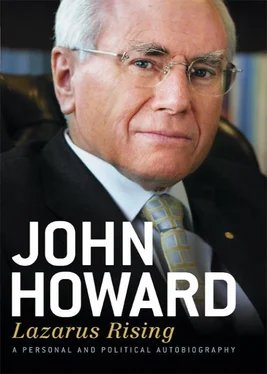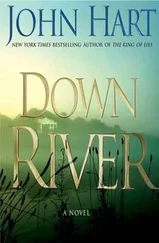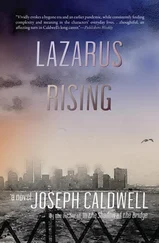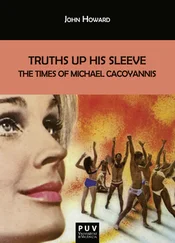All of us felt shock and disbelief at what had happened. It troubled me that Kerr had had to intervene. I knew that he would cop intense abuse from Labor supporters. Yet he had been left with no alternative. Only he,
exercising the reserve powers of the Crown vested in him under the Constitution, could sever the Gordian knot.
Opposition MPs gathered in small groups, discussing the day’s events, speculating about the campaign ahead and expressing just a tinge of apprehension about the reaction of the Australia public to such a momentous event.
That evening Bob Ellicott and I walked together through Kings Hall and came across Jim McClelland, Minister for Labour and Immigration in the Whitlam Government. Known in the Sydney legal profession as ‘Diamond Jim’ on account of his immaculate dressing, McClelland had, as a solicitor, briefed Kerr to appear in disputes involving the Federated Ironworkers’ Association. They had been bitter encounters, and Kerr and McClelland had become good friends. McClelland was very irate and said, ‘You had the Queen’s man in the bag right from the beginning.’ It was a revealing remark. It was untrue but, importantly, betrayed the fact that Labor had operated all along with the belief that because Kerr had been appointed by Whitlam, he would, when the crunch came, do what Labor wanted. It was a monumental miscalculation, for which McClelland, given his long association with Kerr, no doubt felt a special responsibility.
The next morning, the political analyst Malcolm Mackerras dropped into my office and boldly said, ‘You realise that you are now enjoying your last weeks as member for Bennelong. There will be a massive reaction against Kerr sacking Whitlam, and even a safe seat like yours will be lost by the Liberal Party.’ I both thought and hoped that he was wrong, which of course he was. Thirty-one years were to pass before Malcolm, in 2006 and following a redistribution which made my seat even more marginal, again predicted that I would lose Bennelong. This time his forecast proved accurate. In that three-decade period, both Australia and Bennelong had undergone much change.
After 11 November I did not see or speak to Malcolm Fraser until the triumphant party meeting following his massive victory on 13 December 1975. The Coalition’s majority of 55 was by far the largest in Australia’s political history. There had been almost a clean sweep of seats in Queensland; only Bill Hayden’s Oxley was narrowly held by the Labor Party. Even the staunchly pro-Labor city of Canberra had returned a Liberal in one of its two seats.
It had been a bitter campaign, before a deeply polarised electorate. The 35 per cent who habitually voted Labor exhibited their hostility over the dismissal by heaping enormous personal invective on Sir John Kerr, and in this they were aided and abetted by Whitlam and his former ministers. The remainder of the electorate, consisting of habitual Coalition supporters and those in the middle, were grateful for the opportunity of voting out what they regarded as the most incompetent government Australia had had, at least since World War II.
Once an election had been called, debate about the merits or otherwise of the Governor-General’s actions receded into the background, except for those who would resentfully feed on this for the rest of their political lives. The election became a referendum on the performance of the Whitlam Government, and once this was the case, Fraser’s victory was assured.
Naturally Malcolm Fraser and Phillip Lynch were unanimously re-elected to their respective positions at the start of the Liberal Party meeting following our victory. It was an amazing gathering, full of elation, with a sizeable chunk of the party room comprised of people I had never met before. Not only were our ranks swollen by people who had won seats from Labor, but also by those replacing a number of former members who had retired voluntarily.
As a shadow minister, I had some hope of becoming a very junior minister in the new government. I guess, like all other shadow ministers, I had done all sorts of calculations in my head about my prospects, and I knew that Fraser wanted a smaller cabinet than the 32 or 33 which made up the shadow ministry. So I was not overly optimistic.
Just after the meeting ended, John Bourchier, the chief whip, said that the Prime Minister wanted to see me in his office, and I got the clear impression that Bourchier knew I was to become a minister. I felt a keen sense of anticipation and my best hopes were realised when, a short while later, in the Prime Minister’s office, Malcolm Fraser told me that he wanted me to become Minister for Business and Consumer Affairs. I was tremendously excited and couldn’t wait to tell Janette.
Whilst I thought that I had done a good job as a shadow minister, I knew that it was a fine judgement for a leader when choosing younger members in a new ministry. Malcolm Fraser and I have had our differences over the years and our relationship became very distant after I became Prime Minister, but I will always be grateful for the opportunity he gave me back in December 1975. It was a generous promotion at a critical time.
Business and Consumer Affairs was a new portfolio arrangement which brought together many of the business regulatory functions of the federal government, including responsibility for the Trade Practices Act, the Prices Justification Act, and the Industries Assistance Commission and also, potentially, for the national regulation of companies and securities. Also included was the Customs Bureau, of which the Narcotics Bureau, carrying the federal fight against drugs, was part. The business community applauded this new grouping of responsibilities. The cluster of duties I had been given attracted intense scrutiny from the business media.
The Fraser Government inherited a fragile economy. Inflation had soared to 14.4 per cent; unemployment stood at 5.4 per cent; the budget deficit had blown out to a projected 1.8 per cent of gross domestic product (GDP). Federal government spending had risen by a staggering 46 per cent over the two-year period of 1973–74. The Whitlam Government had been an incompetent economic manager; there was a near universal judgement that it would be a long time before Labor would again be trusted with the purse strings.
Most of the senior members of the incoming Government — Fraser, Lynch, Anthony, Sinclair, Nixon, Bob Cotton, Peacock and Greenwood — had been prominent in earlier Coalition governments, and were heirs of the Menzies years, which had been ones of stability and prosperity. They had been, also, years of government regulation, an inward-looking Australian economy, high levels of tariff protection and a centralised wage-fixation system. This regulatory, activist role for government had seemed to work during that time. There had been much activity and full employment. Why then should that approach be changed?
Maintenance of the status quo might have been justified if the world had not changed. The world, however, had changed quite dramatically in the early 1970s. The challenges for the Australian economy were quite different from what they had been previously; different responses were needed. The Whitlam Government had failed totally to realise this. The new Coalition Government would now have the opportunity of doing things differently, and better.
From the perspective of my portfolio responsibilities, I felt that we needed to restore business confidence by cutting government spending, pruning business regulation, providing more incentives for investment, and tackling some of the excesses of union power.
I appointed Paul McClintock, a Sydney lawyer and former president of the Liberal Club at the University of Sydney, as my principal private secretary. Paul had impressed me with his political courage in keeping the Liberal banner flying on a university campus during the early 1970s when, in the wake of debate over Vietnam and other issues, that was a particularly difficult task. Paul would later return when I was Prime Minister as head of the Cabinet Policy Unit.
Читать дальше












